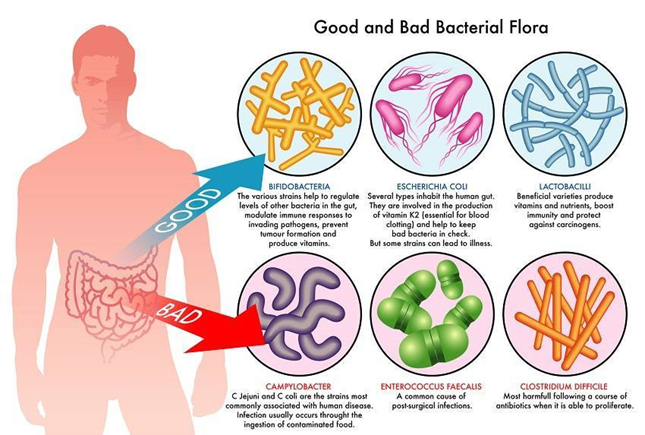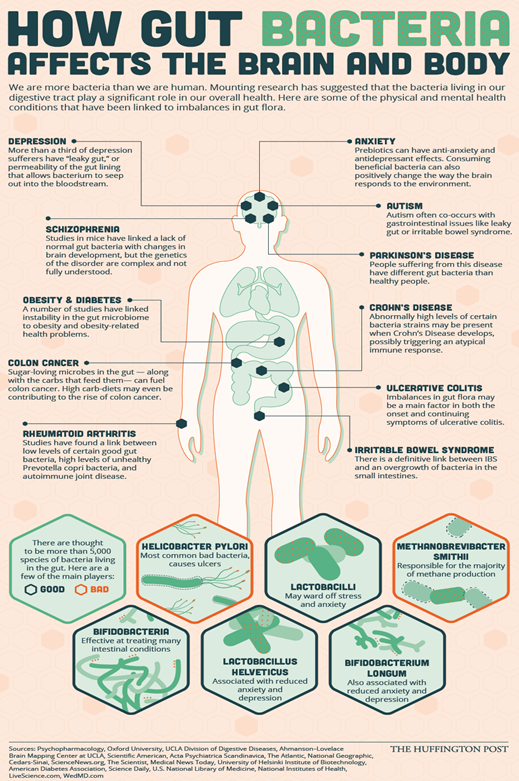Unfortunately, in this modern world, our thoughts, our perceived-stress, our eating and drinking habits, our technology, workload and many more; are not allowing the body to attain homeostasis. When stress has been experienced for too long, it wreaks havoc within the body system.
The first place to be affected is the digestive system – the gut. WHY IS THIS?
When you are stress, the body does not need to work on digestion. However, it needs to bring sufficient blood flow to your hands and legs instead, in order to allow you to fight or flight. When no enough blood is supplied to our digestive system, it will affect the microbial activity in our gut and also impede the immune system residing in the gut. When this happen, it encourages more bad bacteria to grow and lowers the number of good bacteria, thereby creating conditions such as constipation, acid reflux, indigestion, low energy, skin allergies and other discomfort. When the bad bacteria outnumber the good ones, it can affect one’s mental health too.
Almost all gut bacteria are able to produce neurotransmitters. Neurotransmitter is the chemical-messenger that enables communication between neurons, muscle cell or gland cell. In other words, your gut can be your second brain because it has its own network of neurons. These neurons in the gut can affect the neuron in your brain via the vagus nerve; which thereby affects how you think, behave and feel.

An important inhibitory neurotransmitter that is produced by gut microbes. The main function of GABA is to reduce impulses between nerve cells in the brain so that the activity in the brain can be slowed down. In other words, the brain and body are easier to calm down when healthy level of GABA is present in the gut and brain; allowing us to have better control over our emotions and enable us to cope with stress. On the contrary, if GABA is out of balance, either too high or too low, it can lead to anxiety, depression, memory problem, sleeping issue and many other mental health issues.

There are a few simple things that you can do to keep your gut healthy and balanced to avoid too much of the bad one to take over and start affecting the communication between your gut and your brain.

Our body eliminates toxin and waste through our urine, bowel movement and sweat. Water flushes toxins and waste from the body and transport nutrients to where they are needed. If we do not take in enough fluid, the kidney is not able to carry and remove waste products and toxin from the blood. This would result in the colon being dry and it would cause constipation and accumulation of more toxin in the body. Hence, drinking water is essential for our bodies to function efficiently and keep the gut bacteria balance.

Our body needs sufficient vitamins, minerals and nutrients in order to function properly. It is important to take a wide variety of food such as fruits, vegetables, grains, healthy fats and protein. In order to keep the gut flora balance, try to avoid fungi food such as mushroom. Mushroom is a type of fungus that is able to grow and multiply even without sunlight. Do avoid processed food too, as the extra chemical, preservative and other artificial ingredients in the processed food can alter the microbe’s activity in your gut and affect your brain performance. It is best to opt for clean, real and natural food to optimize your gut health and brain health.

It’s always good to take a moment every day to do some deep breathing exercise. Deep breathing exercise enables the body to slow down and allow better communication between the gut and the brain. Your body knows best how to eliminate unwanted toxins and rejuvenate cells. If you are always on-the-go and is unable to relax or have a good quality sleep; your body will always be in vigilant mode, looking out for potential threats. This in turn could impede the rejuvenation process of the body, causing more bad bacteria to increase in the blood and gut; thus, increasing your susceptibility to diseases.

You do not have time to practice deep breathing exercise during the day, you can practice it at night as you’re ready to sleep. When you are lying on your bed, bring all your awareness to your belly, and then take 10 slow deep breathe in and out; ensure your belly is moving up and down as you are breathing deeply. Once you have done the 10th breathing, then bring all your awareness to each and every part of your body, scan your legs, your arms, you gut, your chest, your neck, head and eyes; scan through each part slowly. This is to allow the body and mind to be aligned so that the brain knows that you are already on the bed and ready to sleep, instead of keeping the fight and flight mode on.